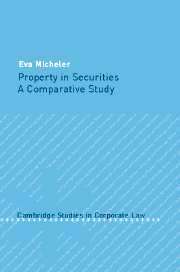Book contents
- Frontmatter
- Contents
- Preface
- Table of legislation
- Table of cases
- Introduction
- 1 Convergence and path-dependence
- Part I English law
- Part II German and Austrian law
- 9 The historic starting point
- 10 Paper transfers
- 11 Impact on the institutional framework
- 12 Immobilisation and its legal analysis
- 13 Evidence of convergence?
- 14 Conclusions on German and Austrian law
- Part III Conclusions
- Select bibliography
- Index
11 - Impact on the institutional framework
from Part II - German and Austrian law
Published online by Cambridge University Press: 28 July 2009
- Frontmatter
- Contents
- Preface
- Table of legislation
- Table of cases
- Introduction
- 1 Convergence and path-dependence
- Part I English law
- Part II German and Austrian law
- 9 The historic starting point
- 10 Paper transfers
- 11 Impact on the institutional framework
- 12 Immobilisation and its legal analysis
- 13 Evidence of convergence?
- 14 Conclusions on German and Austrian law
- Part III Conclusions
- Select bibliography
- Index
Summary
In this chapter it will be shown that the German and the Austrian legal doctrine governing securities impacted upon the type of service provider that emerged in the German and Austrian market to service investors who wish to hold securities indirectly. It will also be shown that the process through which paper certificates were eliminated from the transfer process was shaped by the legal doctrinal framework that governed directly held securities. The market infrastructure for indirect holdings will be examined first.
Indirect holdings
The fact that German and Austrian bearer securities have come to be classified as tangibles has the advantage that the German and the Austrian rules on assignment do not apply to transfers. Transfers are instead subject to rules identical to those governing tangibles. As a result, the transferee is protected against adverse claims. The legal doctrine whereby protection against adverse claims is afforded to the buyer of securities has had a significant impact on the development of the institutional framework prevailing in Germany and in Austria.
The conclusion of section 10.2 was that the rules that protect the transferee of an unauthorised transferor against adverse claims cause the owner to lose her rights to the securities. Ignoring all other requirements for the moment, the transferee in good faith becomes the owner when she acquires possession to the securities. This rule has had a significant impact on the way in which investors hold securities certificates in Germany and in Austria.
- Type
- Chapter
- Information
- Property in SecuritiesA Comparative Study, pp. 182 - 192Publisher: Cambridge University PressPrint publication year: 2007



